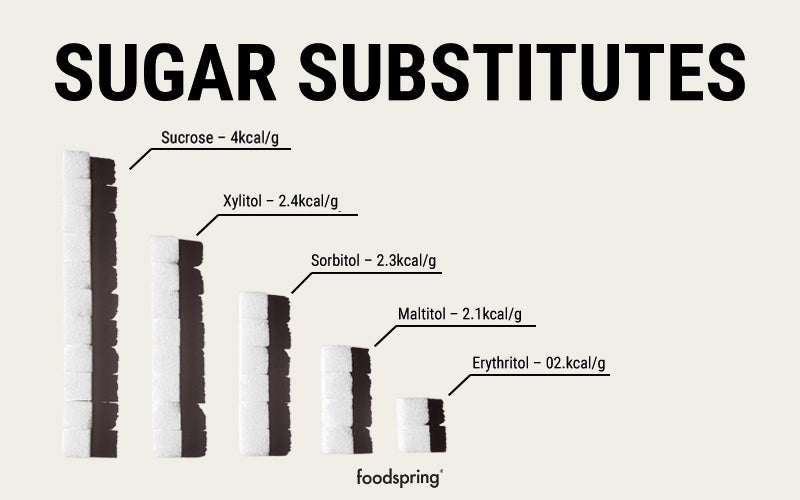Sugar Substitutes in Food
 ©Westend61
©Westend61
Xylitol, maltitol, erythritol – have you lost your way amongst all the sugar substitutes? We’ll give you an overview of the most important sugar substitutes whether it’s for baking or for cooking – and what each one is best for.
What are sugar substitutes, exactly?
Sugar substitutes: These are predominantly sugar alcohols. Because of their sweetness, they are used as an alternative to sugar.
Don’t worry: it has nothing to do with the effect of ethyl alcohol like you find in beer or other alcoholic drinks. Sugar alcohols are polyhydric alcohols.
Like sugar, they belong to the carbohydrate group. They’re also naturally present in small quantities in many types of fruit and vegetables. However, most of the sugar substitutes in food are manufactured industrially.
What are some sugar substitutes commonly used?
Here’s some of the sugar alcohols you might see in ingredients lists.
- Sorbitol
- Mannitol
- Isomalt
- Polyglycitol syrup
- Maltitol
- Lactitol
- Xylitol
And a quick summary of the sugar alcohols most often used as sugar substitutes.
| Type of sugar alcohol | Use in foods |
| Sorbitol | Sorbitol is naturally found in apples and pears, for example. In industrial production, it is obtained from wheat or corn starch.
It is 60% as sweet as cane sugar. |
| Xylitol | Xylitol is found in small amounts in fruits and vegetables. It’s also known as “birch sugar.” Today it’s mainly obtained industrially from agricultural by-products. This includes plant material, such as wood and straw.
Xylitol has the strongest sweetness of all the sugar alcohols. It’s almost as sweet as cane sugar! Xylitol has a cooling effect in the mouth. This explains why it’s often used in chewing gum and sweets. |
| Maltitol | Maltitol is made from corn and wheat starch. It has a sweetness of 70-80% as compared to cane sugar.
Do you want to bake without sugar? Simply replace the sugar with maltitol in your favorite cake recipes. Maltitol is ideal for sweetening desserts because unlike xylitol it leaves a creamy feeling in the mouth. |
| Erythritol | By nature, erythritol is only found in small amounts in fruit, vegetables and cheese. In industrial production, however, it’s taken from carbohydrates. The sweetening power is around 60% that of cane sugar.
Erythritol is almost completely excreted by your body and is only absorbed by your intestines in small amounts. This explains why it has the best intestinal tolerance and the least influence on your blood sugar level among all sweeteners. Since your body metabolizes erythritol in small amounts, it’s almost calorie-free. |
Our tip: If you bake with sugar alcohol, you may have crystals form in your cake. It will make it a little crispier than usual. If you prefer your cake to be soft, increase the amount of liquid in the recipe. Keep in mind, of course, that this can have an impact on the sweetness.

Comparing sugar alcohols and sugar
The special thing about sugar alcohols is that they have a lower caloric value than sugar.
This is because they are not completely metabolized by your body. Depending on the type of sugar substitute, you will therefore consume less calories. Compared to cane sugar, the influence on blood sugar levels is lower and largely insulin dependent. This reduces those annoying fluctuations in your blood sugar level.
Sugar alcohols have the ability to bind water. In large quantities, they can have a laxative effect. This effect is most evident with the consumption of sorbitol.
Compared to industrial sugar, sugar substitutes are more teeth-friendly! This is because the bacteria that cause cavities cannot process sugar alcohols. So they have a non-cavity-producing property.
Delicious. And without extra sugar: instead of granulated sugar in our Coconut Crisp Protein Cream, we use a sugar alcohol called maltitol. Almost as sweet as sugar and with 50% fewer calories, with the extra portion of protein for your muscles.
What are some other sugar substitutes?
Sweeteners are natural or industrially produced substances. They have a sweet taste but at the same time contain nearly no or no calories. That’s why sweeteners are recommended when you are trying to reduce your calorie intake. They are sweeter than sugar, and meanwhile have lots fewer calories than sugar or sugar substitutes. Here’s a list of the most well-known sweeteners:
- Saccharine
- Cyclamate
- Acesulfame-K.
- Aspartame
- Sucralose
What is the difference between sugar alcohols and sweeteners?
Compared to sugar alcohols, sweeteners are sometimes a thousand times as sweet.
Unlike sugar alcohols, they have no nutritional value or calories worth mentioning. Nothing but a sweet flavor – you can’t expect a quick energy boost from sweeteners.
Are sugar substitutes healthy?
According to EU regulations, sugar substitutes and sweeteners both belong to the category of sweeteners.
In general: before a sweetener can be used in a food, it is extensively tested. Essentially, the European Food Safety Authority (EFSA) jointly assesses in expert groups whether an additive is harmless to health.
No acceptable daily intake (ADI) was assigned to sugar alcohols. Therefore, there’s actually no daily maximum allowance!
Here’s a look at the calorie impact your body takes from some of the most common sugars and sugar substitutes.

Our conclusion
- Sugar alcohols in food are mostly not natural alternatives to sugar
- They are only partially metabolized by your body
- Therefore, they have a lower calorific value and are broken down and are especially insulin-dependent
- Sugar substitutes are a great way to save calories
- When using them, you shouldn’t exchange the amount 1:1
- Sweetness, water binding properties and the flavor of each different one must be taken into account
Sources for this article
We at foodspring use only high-quality sources, including peer-reviewed studies, to support the facts within our articles. Read our editorial policy to learn more about how we fact-check and keep our content accurate, reliable, and trustworthy.






























